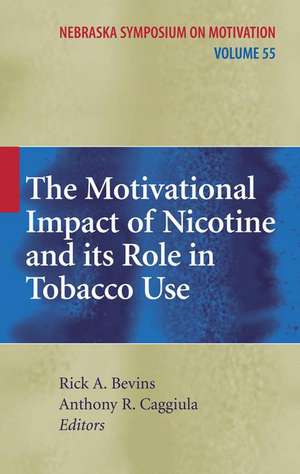The Motivational Impact of Nicotine and its Role in Tobacco Use: Nebraska Symposium on Motivation, cartea 55
Editat de Rick A. Bevins, Anthony R. Caggiulaen Limba Engleză Hardback – 6 noi 2008
| Toate formatele și edițiile | Preț | Express |
|---|---|---|
| Paperback (1) | 636.94 lei 6-8 săpt. | |
| Springer – 19 noi 2010 | 636.94 lei 6-8 săpt. | |
| Hardback (1) | 640.88 lei 6-8 săpt. | |
| Springer – 6 noi 2008 | 640.88 lei 6-8 săpt. |
Din seria Nebraska Symposium on Motivation
-
 Preț: 219.43 lei
Preț: 219.43 lei -
 Preț: 356.35 lei
Preț: 356.35 lei -
 Preț: 367.50 lei
Preț: 367.50 lei -
 Preț: 185.28 lei
Preț: 185.28 lei -
 Preț: 364.62 lei
Preț: 364.62 lei -
 Preț: 361.14 lei
Preț: 361.14 lei - 15%
 Preț: 637.28 lei
Preț: 637.28 lei -
 Preț: 398.42 lei
Preț: 398.42 lei -
 Preț: 362.11 lei
Preț: 362.11 lei - 15%
 Preț: 643.00 lei
Preț: 643.00 lei - 15%
 Preț: 639.73 lei
Preț: 639.73 lei - 15%
 Preț: 642.51 lei
Preț: 642.51 lei - 15%
 Preț: 637.13 lei
Preț: 637.13 lei - 20%
 Preț: 551.32 lei
Preț: 551.32 lei - 15%
 Preț: 639.73 lei
Preț: 639.73 lei - 15%
 Preț: 641.85 lei
Preț: 641.85 lei - 15%
 Preț: 639.73 lei
Preț: 639.73 lei - 15%
 Preț: 643.65 lei
Preț: 643.65 lei - 18%
 Preț: 1003.70 lei
Preț: 1003.70 lei - 18%
 Preț: 786.98 lei
Preț: 786.98 lei - 18%
 Preț: 893.40 lei
Preț: 893.40 lei - 24%
 Preț: 732.54 lei
Preț: 732.54 lei - 18%
 Preț: 727.90 lei
Preț: 727.90 lei - 18%
 Preț: 783.98 lei
Preț: 783.98 lei - 18%
 Preț: 889.29 lei
Preț: 889.29 lei -
 Preț: 440.04 lei
Preț: 440.04 lei -
 Preț: 396.82 lei
Preț: 396.82 lei -
 Preț: 216.31 lei
Preț: 216.31 lei -
 Preț: 438.90 lei
Preț: 438.90 lei -
 Preț: 439.05 lei
Preț: 439.05 lei -
 Preț: 404.28 lei
Preț: 404.28 lei -
 Preț: 434.74 lei
Preț: 434.74 lei -
 Preț: 250.75 lei
Preț: 250.75 lei -
 Preț: 219.61 lei
Preț: 219.61 lei
Preț: 640.88 lei
Preț vechi: 753.97 lei
-15% Nou
Puncte Express: 961
Preț estimativ în valută:
122.64€ • 131.14$ • 102.25£
122.64€ • 131.14$ • 102.25£
Carte tipărită la comandă
Livrare economică 18 aprilie-02 mai
Preluare comenzi: 021 569.72.76
Specificații
ISBN-13: 9780387787480
ISBN-10: 0387787488
Pagini: 212
Ilustrații: XII, 212 p. 53 illus.
Dimensiuni: 155 x 235 x 15 mm
Greutate: 0.43 kg
Ediția:2009
Editura: Springer
Colecția Springer
Seria Nebraska Symposium on Motivation
Locul publicării:New York, NY, United States
ISBN-10: 0387787488
Pagini: 212
Ilustrații: XII, 212 p. 53 illus.
Dimensiuni: 155 x 235 x 15 mm
Greutate: 0.43 kg
Ediția:2009
Editura: Springer
Colecția Springer
Seria Nebraska Symposium on Motivation
Locul publicării:New York, NY, United States
Public țintă
Professional/practitionerCuprins
Nicotine, Tobacco Use, and the 55th Nebraska Symposium on Motivation.- Synaptic Plasticity Within Midbrain Dopamine Centers Contributes to Nicotine Addiction.- Molecular Mechanisms Underlying the Motivational Effects of Nicotine.- Targeting Reward-Relevant Nicotinic Receptors in the Discovery of Novel Pharmacotherapeutic Agents to Treat Tobacco Dependence.- Multiple Motivational Forces Contribute to Nicotine Dependence.- The Role of Nicotine in Smoking: A Dual-Reinforcement Model.- Altering the Motivational Function of Nicotine through Conditioning Processes.- New Findings on Nicotine Addiction and Treatment.- Sex Differences in Nicotine Reinforcement and Reward: Influences on the Persistence of Tobacco Smoking.- The Functional Significance of Craving in Nicotine Dependence.- The Motivational Impact of Nicotine and Its Role in Tobacco Use: Final Comments and Priorities.
Textul de pe ultima copertă
Tobacco kills more people worldwide than any legal or illegal drug; the collective benefits of quitting smoking are plentiful, from improved health, increased life expectancy, and fewer sick days to less stress on families and health care providers. Tobacco use and addiction depend on the complex interplay of neurochemical, genetic, personal, and social factors—and nicotine, as the principal psychoactive ingredient in tobacco smoke, stands at the center of this equation.
The Motivational Impact of Nicotine and Its Role in Tobacco Use assembles papers from the 55th Nebraska Symposium on Motivation in a multidimensional analysis of nicotine at work. These papers present data, theories, and findings useful in understanding not only the mechanisms behind tobacco dependence and resistance to quitting, but also the issues involved in smoking cessation, initial use prevention, and relapse prevention. Some of the key areas covered include:
About the Nebraska Symposium on Motivation
The Nebraska Symposium on Motivation has been sponsored by the Department of Psychology at the University of Nebraska-Lincoln since 1953. Each year the Symposium invites leading scholars from around the world to speak at a conference devoted to a topic of current interest to psychology, the proceedings of which are published in an edited volume.
The Motivational Impact of Nicotine and Its Role in Tobacco Use assembles papers from the 55th Nebraska Symposium on Motivation in a multidimensional analysis of nicotine at work. These papers present data, theories, and findings useful in understanding not only the mechanisms behind tobacco dependence and resistance to quitting, but also the issues involved in smoking cessation, initial use prevention, and relapse prevention. Some of the key areas covered include:
- Molecular and neurobiological perspectives on the motivational effects of nicotine.
- The motivational components of nicotine dependence and the import of learning history.
- The role of nicotine in making environmental cues associated with smoking more reinforcing.
- The effects of pharmaco- and immunotherapies on the ability of psychological cues to influence smoking behavior.
- Sex differences in nicotine reinforcement and their implications for treatment.
- The importance of craving in the maintenance of smoking behavior and in its relapse after quitting.
About the Nebraska Symposium on Motivation
The Nebraska Symposium on Motivation has been sponsored by the Department of Psychology at the University of Nebraska-Lincoln since 1953. Each year the Symposium invites leading scholars from around the world to speak at a conference devoted to a topic of current interest to psychology, the proceedings of which are published in an edited volume.
Caracteristici
Includes effective strategies for decreasing tobacco use and preventing initiation that uses a translational approach in which genetic, neurobiological, individual, and cultural factors motivating tobacco use and nicotine dependence are considered Critically discuss motivation as an explanatory construct for smoking and tobacco use, while empirically defining the processes underlying this construct in a manner that avoids tautologies Gathers information from a diverse group of researchers and academics who presented their findings at the symposium















